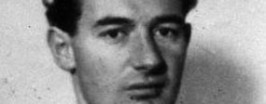Moscow: The chief archivist of Russia’s counterintelligence service has said it will continue searching for clues about the mystery of Holocaust hero Raoul Wallenberg, who vanished while in Soviet captivity.
Lieutenant General Vasily Khristoforov said yesterday that his agency, the Federal Security Service, has no reason to withhold any information about the Swedish diplomat from the public eye. He rejected critics’ allegations that his service, the main KGB successor, could be hiding documents related to Wallenberg’s fate.
“Believe me, had such an information been known to us, the Russia archivists would have been the first to publish and show it,” Khristoforov told a news agency. “When some people say that we are defending the pride of the uniform … It’s ridiculous. This is another state and a different special service.”
Khristoforov insisted that he and his colleagues would have no inclination to whitewash the record of Soviet dictator Josef Stalin’s much-feared secret police, known under its Russian acronym, NKVD.
“I doubt that any of the Federal Security Service officers today would associate himself with the NKVD and would try to defend the uniform of the NKVD,” he said. “That’s why this argument doesn’t stand criticism.” Khristoforov was taking part in an international conference that included researchers from Sweden, Hungary, Israel and Russia.
Some of the speakers strongly urged Khristoforov’s agency to give independent researchers investigating the Wallenberg mystery free access to their archives.
“I think full access is really needed,” said Ingrid Carlberg, a Swedish author who recently published a book about Wallenberg. “They can’t possibly know what kind of puzzles I have that could be matched with pieces of information in those archives. If we put them all together, we will have a clearer picture.”
Wallenberg is credited with saving thousands of Jews in Budapest by distributing Swedish travel documents or moving them to safe houses.
He was arrested in Budapest by the Soviet Red Army in 1945. The Soviets initially denied Wallenberg was in their custody, then said in 1957 that he died of a heart attack in prison on July 17, 1947.

